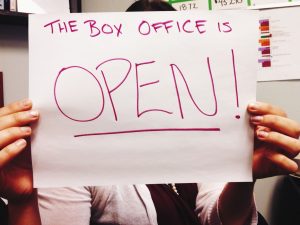Needless beating around the bush: artists will be the last to return to their professions. Who knows when. And when it will happen – travel permitting – they will almost certainly find themselves facing unusual methods of performing as well as treatment of their (thin) rights and compensation. It is a long-standing question, whether the citizen comes before the artist, vice versa, both equally. It is also a matter of perception for which I launch a je m’accuse, for having always defended the magic that dresses the performance from the technical, pragmatic and bureaucratic aspects preparatory to its production while preserving the inalienable right to beauty (but also as a tool to renew its consumers), or perhaps even a legacy of a dusty way of living – and perceiving – the art form.
This perception has a lot to do with what in practical terms takes place in the management of cultural production – and of that beauty, which has now become a suggestive but in itself an indefinite container. Even amid a dramatic moment, activating lucidity is necessary to seize the opportunity to review, reform, that perception of exceptionality and privilege that the artist – and what he produces – embodies. In essence, the B side of magic, that is how much the citizen (tax-payer), before being an artist, signs through contracts and releases that give him the pass for expression.
The “0” point.
The “0” point that separates the arrival to this situation from the departure towards new imaginaries (Ante-Epidemic / Post-Epidemic) constitutes a necessary reason for analysis to identify a vision and share a reflection that starts within the musical-cultural community and reach … practically everyone.
To produce, costs: small and large-scale projects, international productions, (what isn’t it at the time of the globalization of streaming and social media?) involves numerous professionals called to implement them and with them, legal, fiscal and managerial obligations, logistics, preparation, even risk-taking, all long before the performance reaches the public, in a domino of rules that these dramatic days have seen pulverized in the effect (authoritarian?) from “cancellation” to the detriment of thousands of workers. Cancelling the planned schedule is one of the most popular solutions among the institutions at the moment, hurriedly, it cancels an entire sector of services, in addition to the loss of all the public (who, however, receives the option of a ticket refund as well as the panacea of the streamings), in the name of a clause – alongside the closing ordinances of the venues of performances – called “Force majeure”.
The latter is undoubtedly a questionable concept in the case of an epidemic, which is not shared to the same extent by all the countries that call for its application, but has already sadly made those contracts – and so artists and professionals – waste paper.
Can history be rewritten and contracts not?
Suddenly a gigantic tacet has hit on instrumentalists, dancers, writers, painters, singers, conductors, authors, composers, actors, directors, set designers, costume designers, managers … what better time to understand how much art-music-culture-knowledge are necessary goods for each human being and how much the work of each professional individual constitutes a piece of that rich and varied supply chain of the transnational economy and a de facto generator of substantial GDP in all the countries involved in the emergency.
At the moment the artists are paying the bill and with them all those workers who make up the people of the freelance (VAT / IVA) who can no longer count on income but for whom the algorithm of costs and taxes is inexorable.
The “live” show intended as we knew it in the Ante-Epidemic risks assuming an ideological character if we do not keep alive the need to express ourselves; likewise, copyright in all its forms will continue to shipwreck in a partisan disorder if one does not commit to finding suitable and new solutions.
Waiting for politics to find the key to the skein and translate the bureaucratish into facts, let’s roll up our sleeves and look for proposals to continue working and producing that cash which, when placed in the treasuries of the individual countries, ensures everyone, for example, health care combining, at the same time, the request, which became overabundant during the emergency, of contents and entertainment.
Stay home – We come to you.
The invitation / advice / order / decree / law / obligation, depending on the individual countries affected by the epidemic, to stay at home has raised the demand for entertainment to keep – while containing – people away from the risk of contagion for themselves and others.
In the infinity of available contents, the audio-visual ones offered by well-known independent platforms, Films and TV series are the masters, but also a lot of Opera and concerts: access to the first is easy, just pay for a subscription to a platform that provides a service (and judging by the success we are many subscribers) and the proceeds are divided between rights, distribution, production, a percentage also for artists and managers.
Access to the latter is free, it produces zero income, with consequent zero recognition towards distribution, production, artists and managers, for these rights issued at the time of that contract for that engagement in that institution, Ante-Epidemic.
This also happened because of the perception mentioned above and which seems to have dictated the rules: Cinema (even if from home) can be paid thus contributing to its livelihood, Music / Art / Culture “must” be free (despite public and private funding), for that questionable principle from the free-economy according to which by distributing for free, implied consent is established.
One thing is certain: there are more smartphones and tablets than theatres and concert halls; hasn’t the time come to rethink their positioning and function in that necessary oxymoron that is the Art market?

Ideas.
Reprogramming the schedules of the current season and the proposals of the summer Festivals would guarantee the rights of artists and cultural operators, it would also maintain relations with the public, safeguarding their reputation as promoters.
This is an opportunity for the artistic departments, creative teams, and editorial teams to show their skills and reconvert the programming – relying on already approved budgets – recalibrating the contents of performances to closed-doors and screens-on, involving artists available on site (to start again) and in compliance with the appropriate safeguards and safety rules: one can play / sing / dance / recite two meters away from each other (for example using the stalls and parterres).
Let’s monetize the power of content views through the fetishism of purchases (online ticket) and not just by counting on donations. It can be done by balancing the cost of the ticket according to one’s subscriber base and at the same time favouring new strategies for advertising and sponsorships.
We must and can do it while “also” keeping the aspiration alive within the artists of tomorrow, at the threshold of important investments for their own future and for which we represent a point of reference, even in this moment of reflection and the epochal conversion of production and use of Art.
April 5th, 2020
© Anna Bonitatibus
